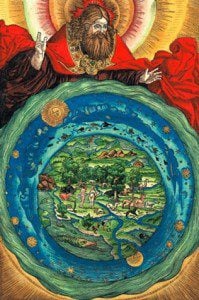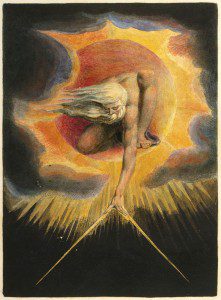I believe in God, the Father almighty,
creator of heaven and earth.
 Having set up the Apostles’ Creed – its importance, the importance of creed-like statements in Scripture, and the role of the rule of faith in the early church it is now time to dig into the creed itself. The initial phrase in the creed is a concise statement of the God in whom we believe. In the previous post, Creeds Before the Canon?, we looked at the way the rule of faith (from which the creed developed) played a role in the early church and served as a standard to separate orthodox and heretical writings and beliefs. We only understand the creed, however, in the context of Scripture. It is not enough to simply “believe in God.” The God we worship is the God revealed in Scripture. The creed summons us to ponder three key characteristics of the God we worship.
Having set up the Apostles’ Creed – its importance, the importance of creed-like statements in Scripture, and the role of the rule of faith in the early church it is now time to dig into the creed itself. The initial phrase in the creed is a concise statement of the God in whom we believe. In the previous post, Creeds Before the Canon?, we looked at the way the rule of faith (from which the creed developed) played a role in the early church and served as a standard to separate orthodox and heretical writings and beliefs. We only understand the creed, however, in the context of Scripture. It is not enough to simply “believe in God.” The God we worship is the God revealed in Scripture. The creed summons us to ponder three key characteristics of the God we worship.
Father. God is not some abstract, distant deity, who set the world in motion and let it be. Nor is God an autocratic despot or an inscrutable force. God is a parent. Described as a father, although feminine analogies are also made at times. Michael Bird (What Christians ought to Believe) points us to three references in Isaiah where God is portrayed as a mother giving birth (42:14), nursing (49:14-17), and comforting her children (66:13). The important thing here is relationship. God is a father to the fatherless, a defender of widows (Ps 68:5). He carried Israel in the wilderness “as a father carries his son” (Dt 1:31). As a father has compassion on his children, so the Lord has compassion on those who fear him (Ps 103:13). Yet you, Lord, are our Father. We are the clay, you are the potter; we are all the work of your hand. (Is 64:8).
The idea of God as father runs through the Old Testament with Israel as his children or son, although there is not a consort. The gods of the surrounding nations were male and female, they lusted and procreated. Asherah was the consort of the supreme Canaanite deity El, Sarpanit was the consort of Marduk. Ra had a number of consorts, some also his offspring. This is not true of the God of Israel. Michael Bird suggests that the language of father is used rather sparingly in the Old Testament, perhaps to dissociate God from the common understanding of the surrounding polytheistic culture. It is a mistake to view God as “male” or “female.”
Jesus used the language of Father often. It is here we find our belief in God as Father most completely described. God is referred to as Father in Matthew 40+ times and almost 100 times in John, less often in Luke, and a handful of times in Mark. In the Sermon on the Mount we are told to “pray to your Father, who is unseen. Then your Father, who sees what is done in secret, will reward you.” …”This, then, is how you should pray: “Our Father in heaven, hallowed be your name,… For if you forgive other people when they sin against you, your heavenly Father will also forgive you. But if you do not forgive others their sins, your Father will not forgive your sins.” (Mt 6:6,9,14) Jesus prayed to his Father and we are adopted as sons and daughters “For whoever does the will of my Father in heaven is my brother and sister and mother.” (Mt 12:50) In John we read that Jesus reveals the Father to us, Philip said, “Lord, show us the Father and that will be enough for us.” Jesus answered: “Don’t you know me, Philip, even after I have been among you such a long time? Anyone who has seen me has seen the Father. How can you say, ‘Show us the Father’?” (Jn 14:8-9)
To name the God who is in heaven as Our Father defines a relationship with him and says important things about his nature.
We believe in God the Father …
Almighty. The God we worship is all powerful and capable of doing whatever he wills. In the Old Testament we read often of the LORD Almighty – a search of the NIV found 276 references. The creed connects this with God the Father spoken of by Jesus. The LORD Almighty of the Old Testament and God the Father Almighty are one and the same.
Almighty … possessing all might, all power. Michael Bird notes that “His power is not limited by anything beyond his own character and being. God always works to bring about what he intends to do” (p. 65) Nothing can thwart his purposes. The story of God’s plan is found in the pages of Scripture. J.I. Packer (Affirming the Apostles’ Creed) writes:
The truth of God’s almightiness in creation, providence, and grace is the basis of all our trust, peace, and joy in God and the safeguard of all our hope of answered prayer, present protection, and final salvation. It means that neither fate, nor the stars, nor blind chance, nor man’s folly, nor Satan’s malice controls this world; instead a morally perfect God runs it, and none can dethrone him or thwart his purposes of love. (p. 49)
We go one step further, though, and affirm God as almighty creator. We believe in God the Father almighty …
 Creator of Heaven and Earth. We find God as creator in Genesis 1-2, setting the stage for all that follows, with continuing references throughout the Old and New Testaments. Michael Bird points to Nehemiah 9:6 as perhaps the best summary. “You alone are the Lord. You made the heavens, even the highest heavens, and all their starry host, the earth and all that is on it, the seas and all that is in them. You give life to everything, and the multitudes of heaven worship you.” The Psalms, Isaiah, and the book of Job provide us with additional insight into God as creator.
Creator of Heaven and Earth. We find God as creator in Genesis 1-2, setting the stage for all that follows, with continuing references throughout the Old and New Testaments. Michael Bird points to Nehemiah 9:6 as perhaps the best summary. “You alone are the Lord. You made the heavens, even the highest heavens, and all their starry host, the earth and all that is on it, the seas and all that is in them. You give life to everything, and the multitudes of heaven worship you.” The Psalms, Isaiah, and the book of Job provide us with additional insight into God as creator.
J.I. Packer notes that affirming God as Creator in the creed serves at least three purposes (paraphrased and summarized from pp. 55-57). First, it stops misunderstanding of God by reminding us that he is responsible for all we see and that we are created in his image, not he in ours. Second, it stops misunderstanding of the world by reminding us that the world is God’s not ours and that we are stewards not owners. It also reminds us that the world is good and that we should not despise material or bodily things. Third, it stops misunderstanding of ourselves. Packer emphasizes that this reminds us that we are not our own master. I would put the emphasis a little differently. We are reminded that God is our maker. We worship and obey him in response. As God’s creation we are of value and we have a mission and purpose in the world bigger than ourselves.
The opening lines of the creed bring us into the biblical story and connect us with creation, the Old Testament narrative, and with the Father revealed in Jesus.
What would you add to this outline?
Why is it important to affirm God as Father, almighty and creator?
If you wish to contact me directly you may do so at rjs4mail[at]att.net.
If interested you can subscribe to a full text feed of my posts at Musings on Science and Theology.











